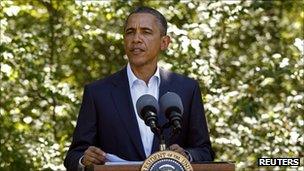Obama: Libya's future is a vital US interest
- Published
- comments

Mr Obama gave a statement from his holiday home in Massachusetts
US President Barack Obama, making a statement from Martha's Vineyard, where he is on holiday, says the situation in Libya is very fluid.
He didn't really add a lot to his written statement from last night, external, beyond more praise for the Libyan people and the Nato alliance.
Unlike UK Prime Minister David Cameron, Mr Obama didn't feel the need to break his holiday and travel back to work, although he does have the excuse that he is taking a break, such as it is, in his own country.
But his policy towards Libya has always been, quite deliberately, not to be in the lead. In part it is simply that he wants Europe to pull its weight in the Nato alliance.
But so much is a reaction to what he believes went wrong in Iraq. He wants the Libyan revolution to be organic, not stamped "Made in America".
Remember the whole Nato policy, of action from the air, was dictated by the insistence that there should be no US "boots on the ground".
Iraq is also the reason behind caution about the future. It is why Obama is urging the opposition to be inclusive and allow all sections of Libyan society to take part in the future. Most believe the rapid dismissal of even the lower ranks of Saddam Hussein's regime ("de-Baathification, external") was a mistake that led to a power vacuum and chaos.
American diplomats are determined that will not happen again and that Col Gaddafi machinery should not be demolished wholesale.
Mr Obama wasn't enthusiastic about the Nato action at the beginning, and many argue that Libya is not a vital US interest.
But its future success, and the avoidance of a failed state, is a vital American interest now.